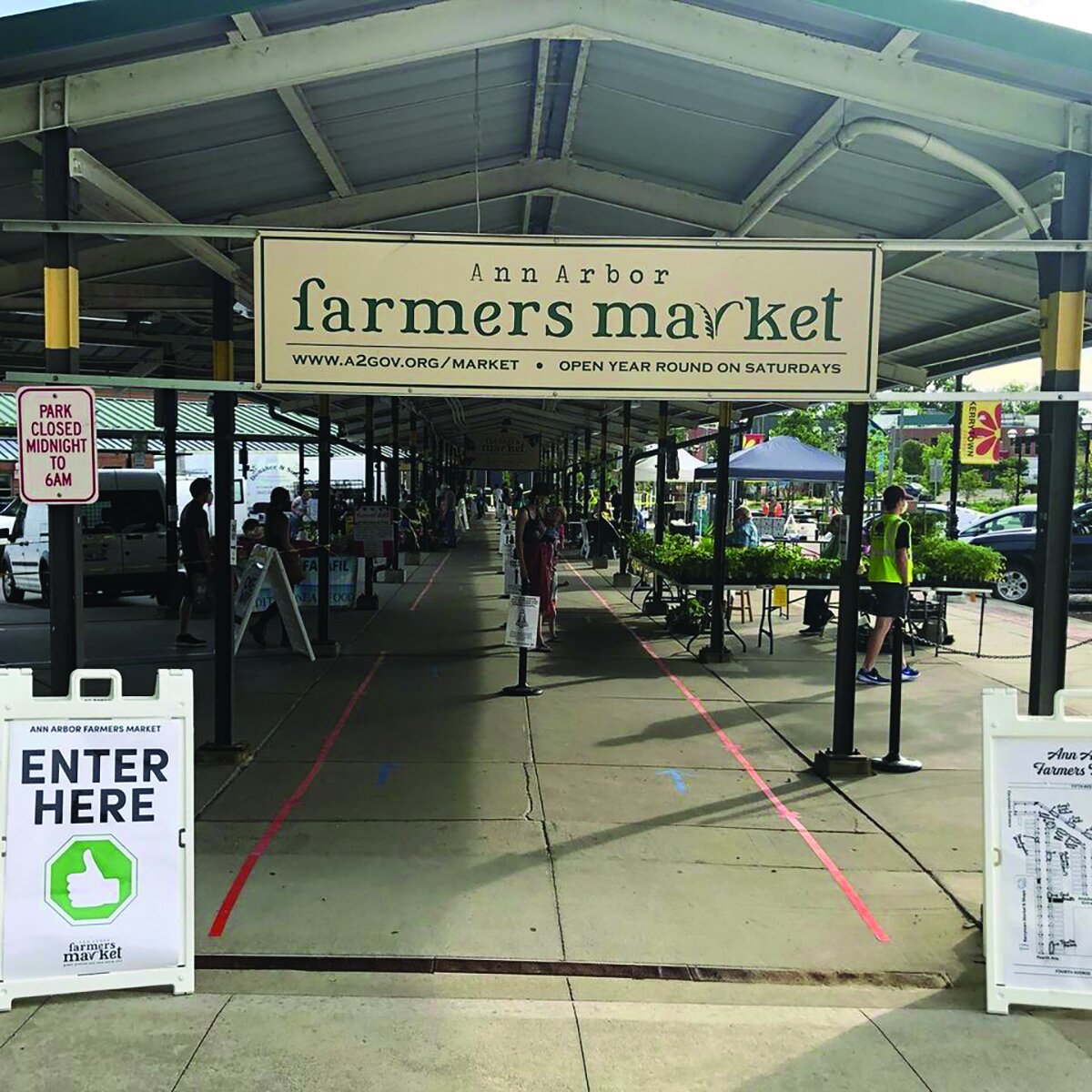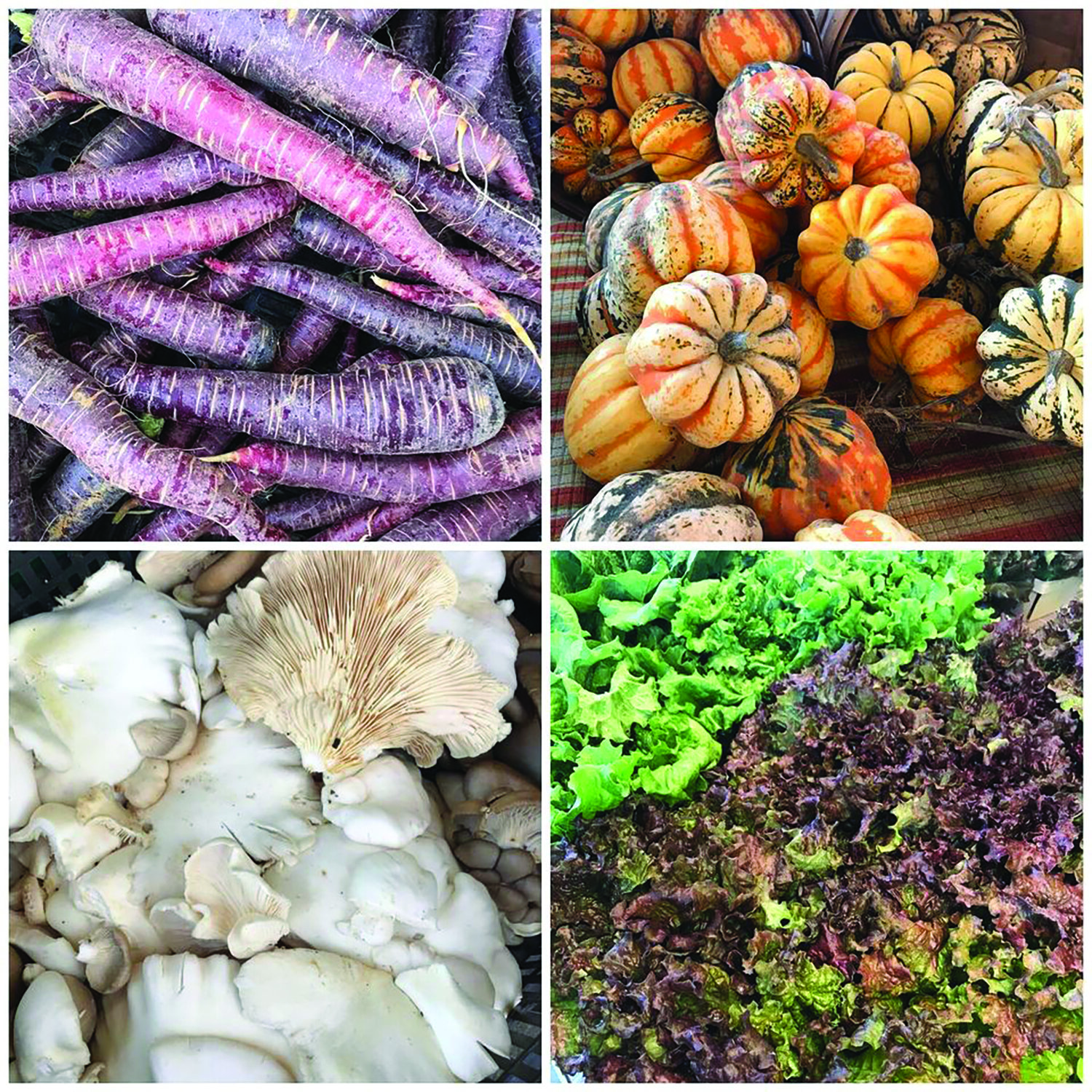By Angela Madaras
I first met Stefanie Stauffer, Manager for the Ann Arbor Farmers Market, while picking up food at Argus Farm Stop. I had seen her at local food events, but this was our first “hello.” I asked her if she was interested in talking about the virus and how the market has handled the challenges. Luckily, she agreed. We later had a Zoom meeting and began carving out slices of topics the public seemed curious to know. Both of us have similar backgrounds. We run small farms as well as have a vested interest in serving all people in our area with healthy, reasonably-priced food grown and produced in our own communities. Her smile and positive attitude eased my mind on the current state of affairs with the market and its vendors. The Ann Arbor Farmers Market shifted into a twice-a-week destination to purchase local food, plants, and arts and crafts. I have been a market enthusiast for many years starting in the mid-eighties when I began shopping and cooking for myself, friends, and family. Saturday morning rituals included a walk to the market with baskets and bags that I would fill with the freshest ingredients for a week of produce-packed indulgences. I feel very lucky to have the many local markets in our area from which to support our local food, plant, and art economy.
I was concerned last spring that the markets would not be able to open with a pandemic in tow. The following interview eased my worries and helped me understand how it worked in 2020 and is continuing to thrive in 2021 and hopefully, well beyond.
Angela Madaras: Stefanie how did you and your team, including Parks and Recreation and the market vendors, create a Covid-safe environment for the Ann Arbor Farmers Market in 2020?
Stefanie Stauffer: We instituted changes like installing hand washing sinks, converting walkways into one-way traffic, closing our bathrooms to the public and putting up portable toilets instead, offering curbside pick-up for pre-orders, and creating a walk-up window for people to purchase credit card and SNAP/EBT tokens. We also instituted a mask mandate for vendors and customers and added more staff to help guide people through the new safety protocols.
Angela Madaras: How long was the market closed? Did you have to open back up in stages?
Stefanie Stauffer: The market was closed from when the Governor’s order first came down in March until May nineteenth or so. We re-opened first as curbside only and re-opened for on-site shopping the end of May. Although we are an essential food service, we closed to be able to formulate a plan to re-open and stay open safely. It had a negative impact on some of our vendors that have early spring items like plants for sale, but we reimbursed vendors for their stall fees during the time we were closed to lessen the [financial] impact.
Angela Madaras: I know you just started your job as market manager in June 2020. Were you in training or involved in some of the earlier conversations which started mid-March? It might help to explain what you were doing prior to running the market.
Stefanie Stauffer: During the hiring process, I was involved somewhat in brainstorming strategies for re-opening. As part of the process, I had to give a presentation about what I would do to help re-open safely and remain open. I am also a vegetable farmer, so prior to the pandemic I had been navigating selling our products at the new online Ypsilanti Farmers Markets, as well as at Argus Farm Stop in Ann Arbor.
Read related article: Voices of Double Up in America
I have over twelve years of experience in our local food system as a grower, producer, educator, advocate, consultant, activist, and mentor. I have been a vendor at the Ypsilanti Farmers Markets for ten years and for over three years I managed Tilian Farm Development Center, an incubator for beginning farmers that was located in Ann Arbor Township. I am a former member of the Greenbelt Advisory Commission, former board member of the Ypsilanti Food Co-op, and a current board member for Growing Hope. In 2013, I completed my PhD in Sociology at UCSB on the topic of local food movements in Michigan and California. Since 2015, I have taught the Sociology of Race and Ethnic Relations at Washtenaw Community College, with an emphasis on food sovereignty and environmental justice movements. I also have spoken widely on topics such as food justice, land preservation, zoning, land access, value-added food production, season extension technology, heirloom vegetable varieties, and seed saving. In 2014, I attended Slow Food’s Terra Madre convergence in Torino, Italy as a delegate representing Michigan family farmers and producers. As an Italian-American with deep ancestral roots in farming, markets, and restaurants, that event was a special type of homecoming that strengthened my commitment to heirloom varieties and expanding access to culturally-appropriate food.
Angela Madaras: Did you lose vendors due to Covid, in the sense they felt nervous? Did any vendors get Covid? If so did it affect the market? Did any staffers or volunteers get Covid?
Stefanie Stauffer: We did not lose any vendors, although we had a few that delayed their start due to concerns about the virus. No market staff got the virus, and we did not take on any volunteers this season due to our desire to reduce the amount of people our staff came into contact with. We had five instances of vendors or their staff being exposed to or testing positive for Covid. Three of those instances happened after the vendor had been at market last so there was no possibility for community spread, although those vendors did quarantine, or were already done for the season. The two others quarantined immediately and did not return to market until they received negative tests. We have been very fortunate to not be disrupted by the virus much other than the initial shutdown.
Angela Madaras: I was very impressed with the sanitation stalls with running water, soap, hand sanitizers, gloves, and masks available for those who came without. Were you the only market with these tools or did others use the same tactics?
Stefanie Stauffer: Those sinks were designed and built by the Ann Arbor Parks and Recreation department. The Michigan Farmers Market Association recommended that markets install hand sanitizing stations as part of their Covid safety plan, but they did not specify the type.
Angela Madaras: Explain how the Parks and Recreation department help operate your market and do they cover other area markets? If not, who is responsible for the operation of all Washtenaw county farmers markets? Explain this system to our readers. Do you and the other managers meet regularly and share ideas? Do vendors have a say in the matters?
Stefanie Stauffer: The Ann Arbor Farmers Market is a City of Ann Arbor park and I am an employee of the Parks and Recreation Department. We are the only market that the City of Ann Arbor operates. Each market in Washtenaw County is different. Some are run by non-profits, some are run by businesses, some are run by municipalities, and some are run by the vendors supported by community members. We try to meet regularly with other market managers from around the county. I can’t speak to what the other markets offer, but our market has a Public Market Advisory Commission that meets monthly and is made up of vendor representatives and community members and all our meetings are open to the public.
Angela Madaras: What has been the feedback from shoppers, vendors, and community members?
Stefanie Stauffer: We have had overwhelmingly positive feedback from vendors, shoppers, and community members who continue to thank us for being open during the pandemic and that we remain open.
Angela Madaras: What is your vision for the spring and summer farmers market? How many vendors do you see selling? Will they offer online sales and will you offer some type of no-contact pick up for those who are at risk? Is there a delivery option for home-bound folks?
Stefanie Stauffer: We have 120 vendors on our full roster, and we anticipate having our usual number of vendors throughout the season. That means 75-80 vendors per market on Saturday in the high season and 40-50 vendors per market on a Wednesday in the high season. Our winter market was strong with 25-30 vendors each Saturday. We also plan on continuing the curbside pick-up for pre-orders option for those requiring a no contact shopping experience. The market itself does not have the ability for delivery, but there may be some farms that can when people place their orders with them directly. Additionally, many of our vendors sell at Argus Farm Stop as well, and they are offering delivery options.
Angela Madaras: Will the food truck nights make a comeback? And will there be a couple warm-prepared food items available from vendors? Will there be seating areas?
Stefanie Stauffer: We hope to resume our Food Truck rallies this year, but it is too early at this point to make that decision. We currently have a few vendors offering warm-prepared foods, and have food trucks join us sometimes on regular market days. It is too early to make a decision about designated seating areas in the market, but there are picnic tables adjacent to our market.
Angela Madaras: I know you do not have a crystal ball…but if you did, what would the Saturday and Wednesday markets look like if Covid seems somewhat under control?
Stefanie Stauffer: For the foreseeable future, we are moving forward with our distancing and other safety measures in place.
Angela Madaras: What are your personal goals for the market this spring and summer and into 2022?
Stefanie Stauffer: My immediate goal is to keep the market open for a safe, outdoor shopping experience. My short-term goal is to expand the array of product offerings at market, including more plant-based items. My long-term goal is to recruit more farmers of color, women farmers, queer farmers, and farmers from other historically marginalized communities so our market can better reflect our broader community. It is also important to me to support as many black-owned businesses as possible.
Well that about sums it up. No fears about finding the growers, makers, and talented hard-working folks who line the walkways of the market every week. You have the online ordering and pick up options if you find that best. Many farms offer online ordering with no contact pick up on market days. Some of them have delivery options as well. Either way, the Ann Arbor Farmers Market is open and waiting for you to partake!
Market hours May through December are Saturday and Wednesday from 7 a.m. to 3 p.m. Winter market hours, January through April are Saturday from 8 a.m. to 3 p.m. Visit a2gov.org/market for more information.





































































































































































































